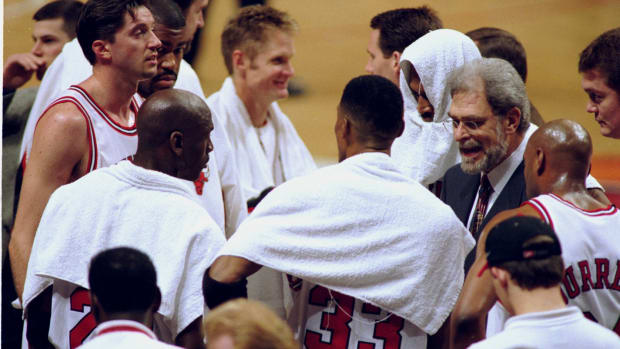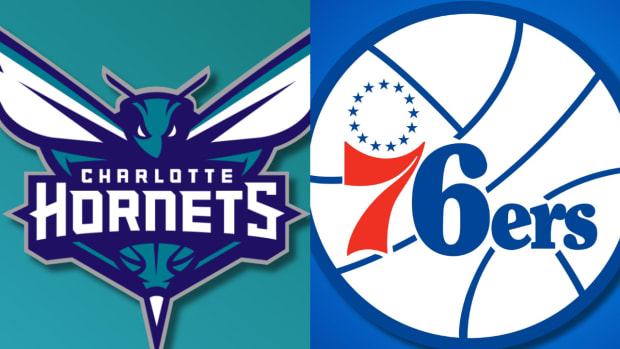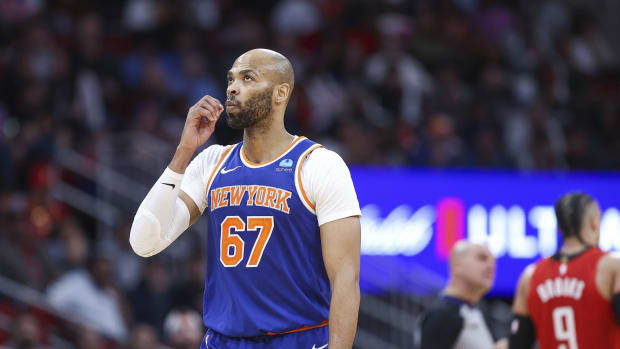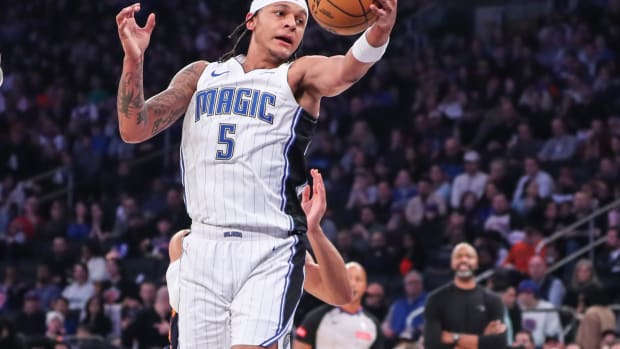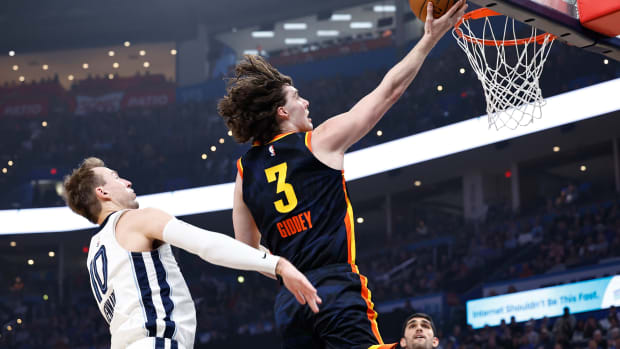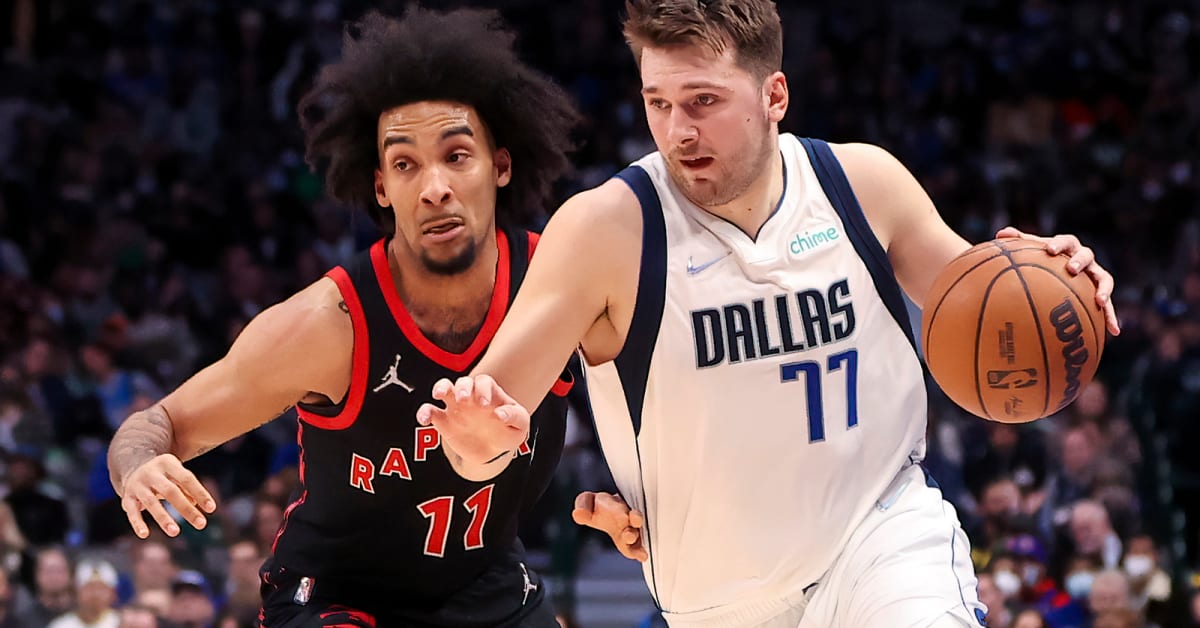
How the Mavericks Became a Stealth Contender
Simmering below Ja Morant’s nightly trapeze act, an endless trickle of status reports about Ben Simmons, Kawhi Leonard and Kyrie Irving, LeBron James’s ongoing quest to fix the broken Lakers and many other storylines that have come to define the first half of this season, the Mavericks are becoming a stealth contender.
Winning 10 of its last 11 games, Dallas is 26–19, an energized fifth seed in a wide-open Western Conference with one of the world’s five most talented players on its side.
But sometimes an impressive stretch is less meaningful than why it’s happening. In Dallas, recent success marks a significant shift in what is and hasn’t been the priority. After not finishing with a top-10 defense since 2012, the Mavs currently rank fourth in defensive rating, with the NBA’s best defense over the past month.
Their roster is mostly unchanged from the previous two years and Dončić still has no obvious All-Star sidekick (the 22-year-old leads the NBA in usage rate for a second straight season), but under new head coach Jason Kidd this team feels better equipped for the playoffs. During his introductory press conference, Kidd quickly mentioned everything he absorbed as an assistant coach with the Lakers, where he won his second ring.
“I will take what I learned from Frank [Vogel] and apply it here because I think when you look at Frank's defense, it's been No. 1 the last two years,” he said in July. “And so here in Dallas, we're going to play a little defense because we know that we can score the ball.” (The Lakers were first in defensive rating last year but third when they won the title in 2020.)
The same message carried into the preseason, where Kidd regularly commented on the importance of stops. But jumping from the NBA’s 21st defense—which is what they were last year—to where they currently are hasn’t been the smoothest ride. In early December, after a disappointing loss against the Pelicans, Kidd said what he probably thought when he first took the job: “This team is built to play offense. This team isn’t built to play defense. We have to get out of that mode.”
Coming off a second consecutive first-round exit, two crystal-clear conclusions were made about the Mavericks. The first was Dončić can’t do everything on his own. Dallas’s offensive rating fell by 35.3 points per 100 possessions when he sat during the 2020-21 playoffs. Adding another independent play creator who could somehow diversify their attack without diminishing its heliocentric ethos felt necessary.
Of course, those players—Mike Conley, Kyle Lowry, etc.—aren’t easy to come by, and when initial plans to acquire them fell through, Plan B meant re-signing their own free agents while adding a couple of solid 3-and-D wings. A major improvement would have to be a mindset, which leads us to the second conclusion. Yes, in the playoffs the offense stumbled when Dončić sat, but the Mavs still generated 114.2 points per possession against the Clippers, were historically efficient two seasons ago and finished eighth in offensive rating last year.
To advance in the absence of a significant talent upgrade, the Mavs would have to balance themselves out with a defense that’s tough, disciplined and nimble enough to complement Dončić’s genius through several rounds of playoff basketball. And somehow, that’s exactly what’s happening.
There’s no obvious schematic shift from last year to this year (or even a few months ago to today) that explains how Dallas became so stout. Having athletic, smart, versatile personnel matters, but an effective and consistent defense ultimately boils down to execution, a collective understanding of scouting reports and an ability to process in-game to myriad adjustments that are made by a perceptive coaching staff. This is the Mavs. They’re adaptable and engaged.
Not to say that they didn’t care about defense last year, but right now they lock into entire possessions in a way they weren’t previously known for. When I asked Reggie Bullock to explain Dallas’s success he immediately repeated the same word twice: effort. “[It’s] the things that we can control: Getting back in transition … getting into the ball, putting pressure on people, picking people up 94 feet.”
Multiple efforts matter, and when they’re made by Dončić—who was called out by his coach earlier this season for not getting back on defense—the team’s ceiling rises several feet.
Over the entire season, Dallas has had the league’s top defense after a made basket, allowing just 1.01 points per possession. And after misses at the rim, they force the longest pace for opposing offenses coming down the other way, a sign of how well they react to being in a vulnerable situation.
The biggest statistical leap has come behind the arc, where the Mavericks hound opposing shooters and allow the second-lowest non-corner three-point frequency and accuracy, according to Cleaning the Glass. Their bigs (including a less creaky Kristaps Porzingis) are active and mobile. They close out well and position themselves to allow fast rotations in tight spaces.
(Sit near their bench during a game and you’ll hear players and coaches constantly shouting at weakside defenders to either take one step toward the paint or back out to the perimeter, depending on their assignment.)
Under Kidd, the Mavs also play bigger than last year, a clear Lakers influence. Porzingis’s minutes at the five and four are now about an even split after he spent 82% and 70% of them at center the past two seasons, respectively.
Opponents are shooting only 52% at the rim when Porzingis is nearby defending it, which is down nearly 10% from what it was last year, and as a team, Dallas is up to third in defensive rebound rate after finishing 17th last season.
Porzingis is probably deserving of his own article for how much better he looks on defense, how well he moves in space and utilizes his immense length all over the floor. Look at everything he takes away on this possession:
Or how comfortable he looks that high on the floor guarding a Damian Lillard pick-and-roll:
When beside Dwight Powell (whose minutes are up three per game this season) or Maxi Kleber (who, when healthy, is one of the NBA’s most underrated defenders, be it blocking shots from the help side or locking someone up in isolation) Porzingis helps fortify a frontcourt that’s been so difficult to score on.
Elsewhere, Dorian Finney-Smith is a tireless, top-tier defensive wing who’s most often responsible for the opponent’s first option and eligible for a massive pay raise this summer. Jalen Brunson maximizes his limited size by always moving where he’s supposed to be and leveraging his low center of gravity. Josh Green sprinkles in the youthful exuberance Dallas hasn’t had in the past and the Mavs allow 8.2 fewer points per 100 possessions with Bullock on the floor.
If Green can stay on the floor without harming Dallas’s spacing in the playoffs, they’ll be able to throw out some real versatile lineups in a playoff series. The Mavs also have a $10.8 million trade exception to fill, and one potential target worth keeping an eye on is Larry Nance Jr. He’s currently out with a knee injury but as a playmaking screen setter who can deter defenses from trapping Dončić during the playoffs, he’d be a solid addition to units that want to have more balance.
The Mavs are better, but still have a ways to go before anyone considers them an odds-on favorite in almost any series they’ll compete in. As a four or five seed, they could be asked to face the Jazz, Suns and Warriors in a row. Not easy! For all the praise their defense is receiving, the Mavericks are still 18th in offense. And out of 165 players in NBA history to average at least seven threes per game, Dončić currently ranks 164th in accuracy. There’s also still no proven secondary ball-handler to ease the pressure Luka will inevitably face (Brunson is fun but the Mavs really can’t score when those two share the floor, especially of late).
But if their defensive intensity maintains and Dončić plays up to his potential, the Mavericks will be one of the more consonant groups in basketball come playoff time—as challenging to scheme against on both sides of the ball as any team in the Western Conference.
More NBA Coverage:
• Daily Cover: Shawn Bradley's Tall Order
• Inside John Starks's 1994 Finals Nightmare
• NBA Midseason Awards: Picks for MVP, Rookie of the Year, More
• Selecting 2022 NBA All-Star Starters































